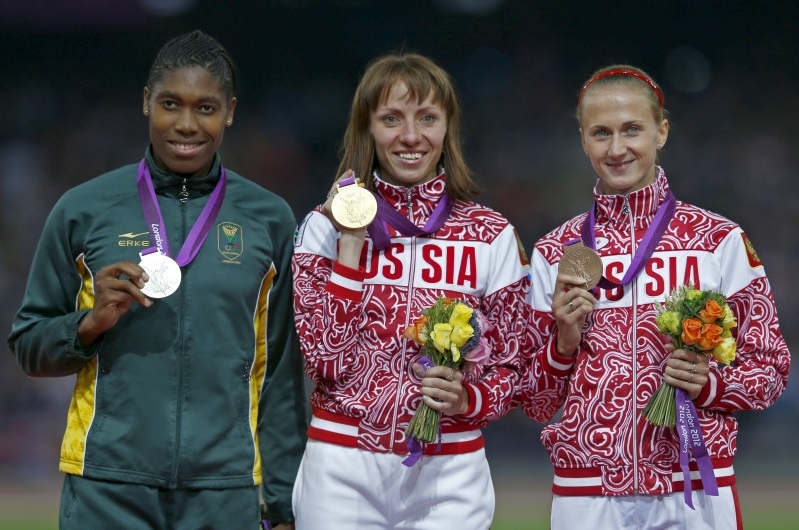
The Kremlin dismissed sweeping doping allegations against its athletes on Tuesday as entirely groundless, while Russia's sporting and anti-doping chiefs suggested the international furor bore all the hallmarks of a "political hit job".
Russia's stature as a sporting superpower is part of President Vladimir Putin's rebranding of his country as resurgent, and allegations from a World Anti-Doping Agency (WADA) commission that Russian athletes have systematically used performance-enhancing substances have cut deep.
"I hope this will not affect the morale of our athletes," Vadim Zelichenok, the acting head of the Russian Athletics Foundation (VFLA), at the center of the burgeoning scandal, told a news conference.
"There is an element of a political hit job here because quite a few things were described (in the report) in a biased way," he said, insisting there was no corruption in the Russian sporting establishment.
The WADA commission recommended Russia be suspended from international competition. If endorsed by the International Athletics Federation (IAAF), the proposal could see Russian athletes excluded from next year's Olympic games in Brazil.
IAAF head Sebastian Coe has given Moscow to the end of the week to respond to WADA accusations of a state-sponsored doping culture, extending to athletes and coaches, and other allegations of collusion in payment of bribes to suppress medical results that pointed to doping.
Though sports-related, the imbroglio is likely to play into Russia's wider political and media discourse which, fueled by the aftermath of the Ukraine crisis, is dominated by portrayal of a standoff between Russia and the U.S.-led West in which Moscow is often unfairly maligned.
Nikolai Durmanov, the former head of Russia's anti-doping agency, described the allegations as complete nonsense and as a literary work based upon "a political order".
The previous head of Russia's athletics federation, Valentin Balakhnichev, whom the report sharply criticized, left his post in February this year.
He has repeatedly denied allegations of wrongdoing and told the TASS news agency on Tuesday he intended to take legal action to defend his name and that of Russian athletics.
Russia is still smarting from talk, emanating from some Western politicians, about the possibility of stripping it of the right to host the 2018 soccer World Cup because of a corruption scandal that has engulfed football's world governing body, FIFA.
Putin, who has yet to comment on the doping allegations, said in May he saw the hand of Washington behind the FIFA scandal, accusing it of trying to block re-election of Sepp Blatter, a strong Russian ally, as FIFA president. Blatter has since been suspended and is under criminal investigation.
Putin, a keen ice hockey player, has premised much of his promotion of a resurgent Russia on its sporting success, portraying its hosting of a successful winter Olympics in Sochi in 2014 as a symbol of a newly confident nation.
'GROUNDLESS ACCUSATIONS'
Putin's spokesman on Tuesday dismissed the doping allegations.
"Until some evidence is presented ... it is difficult to accept these accusations, they are quite groundless," Dmitry Peskov, Putin's spokesman, told reporters.
The athletics scandal is deeper-reaching than the FIFA affair or corruption revelations at the International Olympic Committee 15 years ago in that it has directly affected results on the field of sport. Medals would have gone to athletes who had cheated, while more deserving competitors were denied awards.
Russia came fourth overall in the 2012 London Olympics, wining a total of over 80 medals. If its athletes had been excluded it would still have finished fourth, but won about 20 fewer medals.
Nikita Kamaev, the head of the Russian Anti-Doping Agency, said a Moscow laboratory used for doping tests had been shut down after its accreditation was suspended by WADA.
Kamaev said allegations about a secret second laboratory and the alleged role of Russia's FSB Security Service in covering up doping were the stuff of fantasy.
"It's absolute rubbish, people have an over-active imagination," he told a news conference. "The stuff about a secret lab in the basement of the Lubyanka (nickname for FSB headquarters) does not stand up. The people (who said this) are living in the era of James Bond films."
The exchanges will indeed have revived memories for some of doping revelations in Soviet bloc countries during the Cold War. In East Germany, for instance, the Stasi secret police were closely involved in doping programs.
The commission said the Russian anti-doping laboratory in Moscow destroyed 1,417 samples shortly before a scheduled WADA inspection. Russian authorities said they had been ordered to destroy them by WADA itself.
Russia's sports ministry struck a mixed tone.
On the one hand, it said it was open to greater cooperation with WADA, the world anti-doping agency, so that it could eliminate any irregularities in its own anti-doping regime. But in the same statement it complained about the way the WADA commission report had been presented in the media, urging the organization to base any future conclusions on facts.
It also reminded WADA it had no right to "predetermine" the future actions of international sporting bodies, a spiky response to a recommendation that Russian athletes be excluded from international competition.
There were some problems, the ministry conceded, without specifying what they were; but it said it had acted to redress shortcomings, changing the leadership of the country's athletics federation and appointing a new senior trainer.
The commission report recommended lifetime bans for five athletes, four coaches and one doctor, all Russian. They included the women's 800 meters Olympic champion Mariya Savinova and the bronze medalist, Ekaterina Poistogova.
"Russia's ministry of sport is waiting for similar measures to be taken by the International Athletics Federation," it said.
Moscow residents interviewed by Reuters said the allegations looked like a spiteful attempt to rein in the country's sporting success.
"It is a politically-motivated attack on our sport," one man, Dmitry, who declined to give his surname, said.





![[Exclusive Interview] A revelation within the brink of life and death — Meg Leung’s mission in Christian art](https://www.gospelherald.com/media/cache/thumbnail/7/21/72163sp_273w_150h_1x_1y.jpg)

